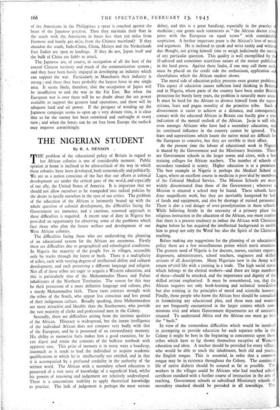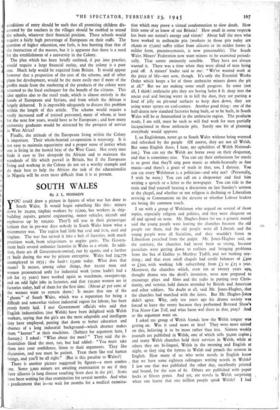THE NIGERIAN STUDENT
By R. A. HENSON .
The difficulties facing those who are undertaking the planning of an educational system for the African are enormous. Firstly there are difficulties due to geographical and ethnological conditions. In Nigeria the majority of the people live in villages, accessible only by tracks through the forest or bush. There is a multiplicity of tribes, each with varying-degrees of intellectual ability and cultural development, and each possessing a different language and religion. Not all of these tribes are eager to acquire a Western education, and this is particularly true of the Mohammedan Hausa and Fulani inhabitants of the Northern Territories. The reason for this may be their possession of a more definitive language and culture, plus a sturdy Mohammedan faith. These races contrast strongly with the tribes of the South, who appear less conscious and less proud of their indigenous culture. Broadly speaking, these Mohammedans are more attractive and likeable than the. Southerners, who provide the vast majority of clerks and professional men in the Colony.
Secondly, there are difficulties arising from the intrinsic qualities
of the African. Illiteracy is widespread, but the innate intelligence of the individual African does not compare very badly with that of the European, and he is possessed of an extraordinary memory. His ability to memorise facts makes him a good examinee, for he can digest and retain the contents of the bulkiest textbook with apparent ease. This prize of memory is in many ways a handicap, inasmuch as it tends to lead the individual to acquire academic qualifications to which he is intellectually not entitled, and in that it is accompanied by a profound credulity in the authority of the written word. The African with a secondary school education is possessed of a vast store of knowledge of a superficial kind, whilst his powers of reasoning and judgement are relatively undeveloped. There is a concomitant inability to apply theoretical knowledge to practice. The lack of judgement is perhaps the most serious
defect, and this is a great handicap, especially in the practice medicine ; one greets such statements as "the African doctor coin petes with the European on equal terms" with considerabl scepticism. A further important point is the African's love of word and argument. He is inclined to speak and write rashly and withon due thought, not giving himself time to weigh judiciously the meni of any particular question. This quality is well exemplified by th ill-advised and sometimes scurrilous nature of the matter publishe in the local press. Against these faults, if one may call them such must be placed on the credit side the enthusiasm, application an cheerfulness which the African student shows.
The moral side of education policy presents even greater problems This aspect of education causes sufficient hard thinking in Britai and in Nigeria, where parts of the country have been under Britis protection for barely forty years, the problem is naturally more acute. It must be hard for the African to divorce himself from the super stitions, fears and pagan morality of the primitive tribe. Such divorcement is easier to achieve at a distance, and consequentl , contact with the educated African in Britain can hardly give a true indication of the mental outlook of the African. Ju-ju is still rife, even amongst Africans who have had a secondary education, and its continued influence in the country cannot be ignored. The fears and superstitions which haunt the native mind are difficult for the European to conceive, but they are terrible in their effect.
At the present time the labour of educational work in Nigeria is shared by the Government and the Missionary Societies. There
are Government schools in the larger towns and cities, with a few training colleges for African teachers. The number of schools of secondary standard is scanty. Higher education is at a premium. The best example in Nigeria is perhaps the Medical School at Lagos, where an excellent course in medicine is prov-ded by members of the Colonial Medical Service. The Mission Schools are more widely disseminated than those of the Government ; wherever a Mission is situated a school may be found. These schools have done magnificent work, but they are inevitably hampered by lack of funds and equipment, and also by shortage of trained personnel. There is also a real danger of over-proselytisation in these schools. While believing firmly in the necessity of a primary place for religious instruction in the education of the African, one must confess that there is a present tendency to imbue the African with Christian dogma before he has acquired the intellectual background to enable him to grasp not only the Word but also the Spirit of the Christian teaching.
Before making any suggestions for the planning of an educational policy there are a few miscellaneous points which merit attention. The greatest need of Nigeria is for doctors, nurses, sanitary experts, dispensers, administrators, school teachers, engineers and skilled artisans of all descriptions. Many Nigerians now in the Army will return tecivil life with a training in a trade. The high social status which belongs to the clerical workers—and there are large numbers of these—should be attacked, and the importance and dignity of the skilled artisan emphasised. It must be remembered, too, that the African requires not only book-learning and technical instrUction but also training in the principles of moral and scientific honesty. Finally, those people who know the African best should be consulted in forniulating any educational plan, and these men and women are not frequently encountered in the larger centres which com- missions visit and where Government departments are of necessity situated. To understand Africa and the African one must go into the "bush."
In view of the tremendous difficulties which would be involved in attempting to provide education for each separate tribe in the Colony it might be best in the beginning to concentrate upon those tribes which have so kr shown themselves receptive of Western education and ideas. A teacher should be provided for every village. who would be able to teach the inhabitants, both old and young, the English tongue. This is essential, in order that a common tongue may be in existence throughout the Colony. The continued life of native dialects should be assured as far as possible. The workers in the villages could be Africans who had reached school certificate standard with a further course of instruction in the arts of teaching. Government schools or subsidised Missionary schools ot secondary standard should be provided in all townships. The
•
conditions of entry should be such that all promising children dis- covered by the teachers in the villages should be enabled to attend the schools, whatever their financial position. These schools would require a fairly high percentage of Europeans on their staffs. The question of higher education, one feels, is less burning than that of the instruction of the masses, but it is apparent that there is a need. for the .establishment of a university in the Colony.
The plan which has been briefly outlined, if put into practice, would require a large financial outlay, and the colony is a poor one. Much help would be required from Britain. It would appear however that a proportion of the cost of the scheme, and of other plans for development, would be the more easily met if more of the profits made from the marketing of the products of the colony were returned to the local exchequer for the benefit of the citizens. This idea applies also to the retail trade, which is almost entirely in the hands of Europeans and Syrians, and from which the African is largely debarred. It is impossible adequately to discuss this problem within the length of this article. The scheme would require a vastly increased staff of trained personnel, many of whom, at least for the next few years, would have to be Europeans ; and how many university graduates would be attracted by the prospect of service in West Africa?
Finally, the attitude of the Europeans living within the Colony is important. Their whole-hearted co-operation is necessary. It is not easy to maintain equanimity and a proper sense of justice when one is living in the humid heat of the West Coast. Not every man finds it easy to live alongside the African and to maintain the standards of life which prevail in Britain, but if the Europeans living and working in the Colony do not set a worthy example and do their best to help the African the task of the educationalist in Nigeria will be even more difficult than it is at present.



























 Previous page
Previous page